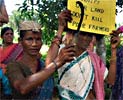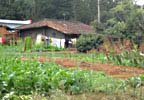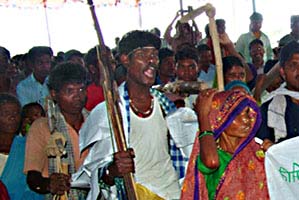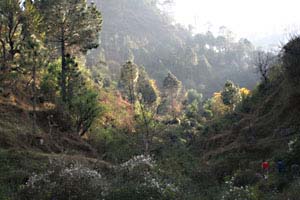Alternative Conference Global Warming
Uttarakhand Center
Ministers of Himalayan States came together to discuss global warming issues in Shimla, end of Obctober 2009. Activists
had their alternative meeting. "Cement industries, hydro power projects that are re-routing the rivers through tunnels, dams and
steel units are responsible for disturbing the local ecology, climate and also cause a rise in local temperature," said an environment
activist. (Another:) "In view of the melting of glaciers, which is a symbol of climate change, Himalayan states need to protect
their forests. After glaciers, forests are the biggest resources of water for the Himalayas and other regions and the governments need to
engage in participatory forest management."
'People's Movement in State Sees no Need
to Discuss Climate Change,
Asks Govt to Review Impact of Projects on Ecology'
Archana Phull, Hindustan Times, end of October 2009.
Shimla: People's movement Himalaya Neeti Abhiyaan has termed the ongoing Himalayan CMs' (Chief Ministers = state prime ministers) conclave on climate change a farce until the host comes out with a sustainable development model first.
"The conclave on climate change is a fashion statement in the run up to the Copenhagen conference (on climate change in December 2009), but it's futile unless the local factors leading to climate change are checked."
"The government is not keen to review its industrial policies which have contributed to environment degradation and climate change at some level," Himalaya Neeti Abhiyaan president Kulbhushan Upmany said on Thursday (29th) in Shimla.
(..) Local rise in temperature because of hydro-electric projects has affected the people's livelihood. Climate offenders should pay for the crime. In Himachal Pradesh this year alone, annual rainfall has dropped by 30 to 74 per cent. Chamba, one of the 50 most backward districts of the country, suffered the brunt of this decline and 60 per cent of the crop was damaged.
"Te government has now approved projects to set up even thermal power plants, which will add to pollution and global temperature. The regime is setting up cement plants and mines to destroy whatever is left of the environment," Upamanyu pointed out.
* * *
'Civil Societies Seek Attention on Local Factors'
Express News Service - Shimla, October 30, 2009.
Civil groups working on environment issues in Himachal Pradesh, Jammu and Kashmir and Uttarakhand have sought immediate attention of the state governments towards local factors contributing to climate change in the Himalayas.
The groups working in these three states are of the opinion that though many global factors responsible for overall climate change are out of the reach of the state governments, they need to contribute their bit by not allowing industries that require over-exploitation of natural resources in the Himalayan region. "Cement industries, hydro power projects that are re-routing the rivers through tunnels, dams and steel units are responsible for disturbing the local ecology, climate and also cause a rise in local temperature," said an environment activist.
After holding a parallel conclave on climate change in Shimla on Friday (30th), the group of over 200 activists handed over a memorandum of their observations to the chief ministers of Himalayan states and Union Minister of State for Environment and Forest Jairam Ramesh, who were present at the conclave being organised by the Himachal Pradesh government.
Kulbhushan Upmany of Himalaya Neeti Abhiyaan said: "In view of the melting of glaciers, which is a symbol of climate change, Himalayan states need to protect their forests. After glaciers, forests are the biggest resources of water for the Himalayas and other regions and the governments need to engage in participatory forest management."
Go to next article: Shimla declaration of the alternative conference global warming
or to: Overview articles and photos about resistance in Uttarakhand Center





